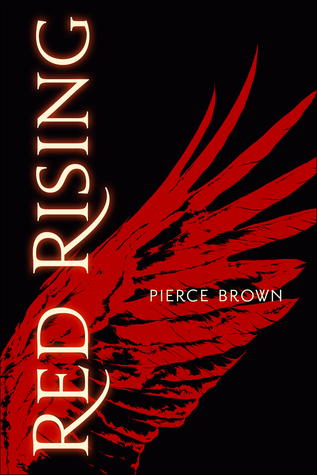
Ray Bradbury and Edgar Rice
Burroughs enthralled me with their stories about Mars. When I read about the
Red Rising series it had Alison written all over it: set on Mars in the future,
check. Starts in a mining society, check. Infiltrating nobility modeled on
Roman mythology, check. I was all over it.
However, I found Red Rising fell
flat for me, at least for most of the novel. I liked Darrow and his mining
community, as well as his wife, Eo, and the permanent contest for the Laurel to
win more food for the families in his division.
WAIT A MINUTE. This sounds
familiar, right? If you’re thinking Hunger Games, it’s kind of impossible not
to. Granted, any dystopian novel now is automatically held up to Katniss Level,
but I was determined to give Red Rising a chance as a separate novel.
I ended up liking, not loving,
the book. I didn’t get enthralled as I was with Wool, when I simply couldn’t
stop turning the pages and found it was 2 am and ‘time for just one more
chapter.’
The reason for my disconnect, I
think, was the unwieldy nature of the plot. Pierce Brown starts the action in
the mining society, but a quarter of the way through it switches to the elite
society of the Golds complete with ANOTHER contest in an academy between twelve
houses of students.
This means I had to forget the
first world as well as its complex structure of characters and start over with
a completely new (and extremely large) group of new characters. Hang on – make
that twelve groups of characters, since there are a dozen Houses completing for
the top spot.
Brown succeeds somewhat, although
having such a huge task bogs down the book. As a result, the final part suffers
from White Room syndrome. We move from the mines, to a rebel outpost, to a
training facility, to another facility, to a castle, a cave, another castle, a
field, a forest… I felt like Johnny
McCartney, Paul’s grandfather, from the Beatles’ film A Hard Day’s Night - “I
thought I was supposed to be getting a change of scenery. But so far, I’ve been
in a train and a room, and a car and a room, and a room and a room.”
All this meant I couldn’t really
picture where Darrow and Cassius / Mustang / Roque / whoever were at the
moment. If Brown had spent a bit more on world-building I think he would have
seen his setting was too huge, too overbearing. It’s easy to slap on another
castle or facility for your plot – much harder to keep things simple and really
explore the microverse you’ve created for your readers.
Even the characters were White
Roomed. Darrow completely changes his appearance when he infiltrates the upper
echelon of the Golds, so I had no idea what he looked like (except he’s
supposed to be gorgeous, of course.) Ditto Eo, his wife, (but of course she was
gorgeous as well.) Then there’s Cassius, who is athletic and gorgeous, and
Mustang, also athletic and gorgeous…. At this point I glazed over. WHERE ARE
THE CHARACTER FLAWS?
Much has been written on the subject of Brown’s language. It’s supposed to be archaic, with a hint of epic fantasy and an original construct. As a result we have words like ‘gorydamn, gravboots, HighLingo, gorywell, drillBoy, goryballs…’ Yeah. There’s a lot of gory going on. However, I can deal with made up words. What I couldn’t get past was the idea that miners would sing songs with lines like these: ‘We fell and fell and danced along to croon a knell of rights and wrongs…’
TO CROON A KNELL? REALLY? I found myself longing for good, old-fashioned Anglo-Saxon curses at that point.
However, what kept me going was the repeated plotpoint that all contests were pre-decided. No matter what one does, Darrow discovers, the outcome is already written. And so, of course, he decides to change it.
That decisiveness in the face of
injustice kept me reading to the end, hoping for justice. And along the way,
the book gelled and became interesting just in time for the next installment in
the series, of course.
I understand Red Rising is
already optioned for a movie. Probably it will do well, since the actors will
give actual faces to the vague characters, and staging will create real
settings. If you enjoyed Jupiter Ascending and don’t mind slogging through an
overblown beginning to reach a better finale, you might give Red Rising a try.
Buy Red Rising at Amazon
Girl Who Reads is an Amazon advertising affiliate; a small commission is earned when purchases are made at Amazon through the above links.



.png)
















Hmm, this one has been on my TBR for a while. The premise does sound an awful lot like Hunger Games. I may still give this one a chance. We'll see.
ReplyDeleteI found the character development and world building to be top notch. In fact, it was those two things that made me fall in love with the story. "Where are the character flaws?" There isn't a single perfect character in the story. Each character is uniquely flawed in a flawed system. It's interesting that you mentioned you liked the book (not loved) even though it seems the few positive comments in the review are laced with a negative coat. Certainly not every book is a good fit for everyone, and I appreciate that. I just had a hard time understanding this review that seems really negative in spite of the "I ended up liking the book" comment.
ReplyDelete